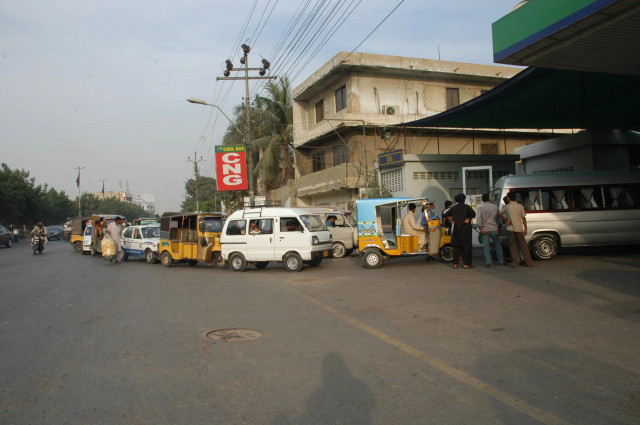Misguided policies: The farce of the CNG shortage, myth or reality
Government overly focused on protecting public sector companies.

The price increase seems designed simply to safeguard the interest of the public sector gas companies. This is poor public policy. It creates inefficiencies and worsens inequalities. Instead of trying to control the gas market, government should promote competition and that also means privatisation.
Sources in the government say that one reason for this massive increase is made to save two major gas utilities Sui Northern Gas Pipelines Limited (SNGPL) and Sui Southern Gas Company (SSGC) from default. It is ironic to note that these utilities are suffering from abnormally high UFG (Unaccounted for Gas) losses of over 10 per cent.
According to a report Pakistan’s Natural Gas reserves are estimated to be 885.3 billion cu m (as of Jan 1 2009) which are enough to last for about 20 years even if there is no further exploration. In order to save foreign exchange Pakistan restricted its petrol imports and shifted the complete industry structure to the usage of gas as a primary fuel because gasoline prices are the highest in the region. At present there are around 2,941 CNG refuelling stations in the country and an approximate of 2.19 million vehicles that use CNG as the primary fuel.
Pakistan is one of those countries where control on carbon emissions has proven to be extremely difficult because government regulations are not well defined. In such a scenario the use of CNG in vehicles is a positive shift because it is much less polluting than regular gasoline (petrol). The emissions from CNG vehicles consist of water vapours and carbon monoxide (CO) and the CO content is also 90% less than CO found in gasoline (petrol) exhausts.
Apart, from the massive spill over effects that will further weaken the economy, the government has failed to realise that such actions cause deviation from the equilibrium which results in economic inefficiencies and increase of deadweight losses. When prices are controlled artificially this destroys the market equilibrium and reduces the economic surplus.
Another important aspect is exacerbation of inequalities - those who consume less gas because of the price rise will be those unwilling or unable to pay and, given the inelasticity of demand, that will mean the poorest will be most affected by the government’s aim of rescuing the companies. As the demand for gas is inelastic, consumers will absorb the price, producers’ revenues will rise and it will constitute a significant reduction in real incomes, with implications for spending on other goods.
The solution to the problem is not in raising the prices. We are operating under the conditions of an imperfectly competitive supply which in itself is a case of market failure associated with loss of economic efficiency. The imperfect competition is a situation where firms are not forced to reduce price to the point where there are no supernormal profits, therefore, prices are too high and the amount produced too little to be socially optimal. The solution to this problem as well as other problems including shortage of electricity and water is in promoting competition and privatisation. The role of government is not to establish a committee to revise prices after every fifteen days rather it is to establish protocols which improve public service and efficiency.
The writer is a policy analyst from Carnegie Mellon University
Published in The Express Tribune, January 9th, 2012.



















COMMENTS
Comments are moderated and generally will be posted if they are on-topic and not abusive.
For more information, please see our Comments FAQ